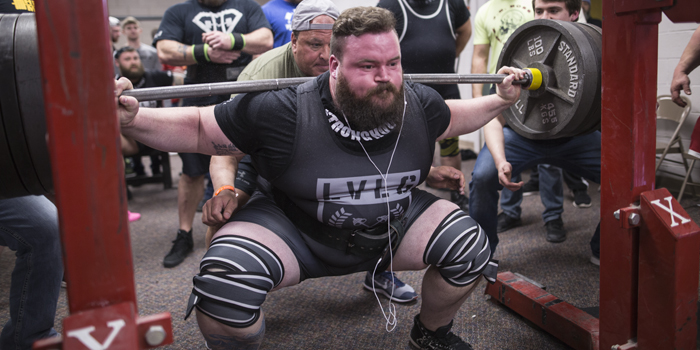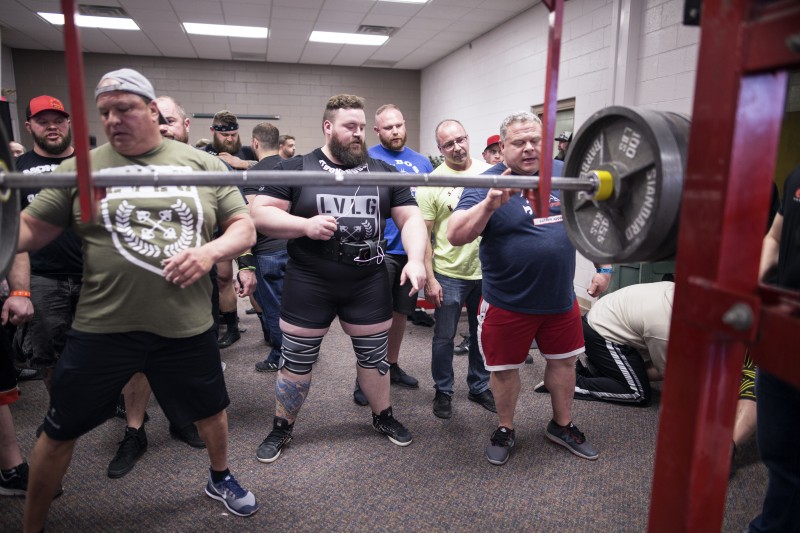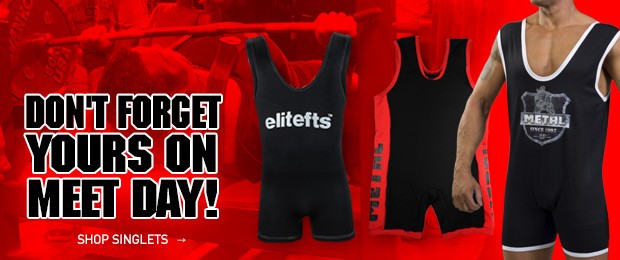
I was walking up to the platform when I heard my dad’s gravelly encouragement. “Give 'em hell, Jimbo!” I was on my third squat attempt; I had missed the first two, so if I didn’t successfully complete the rep, I would be out of chances and out of the meet. Months of obsessive training would be lost.
I trained differently for this meet than any of my previous competitions. Powerlifting always happened alongside my football training, and at this point in my career I was in the process of switching positions, which included a 30-pound weight shed in about three months. As a coach, I would never recommend someone try it. As a player, I had made the decision to switch from defensive line to linebacker and needed to get down to 240. Hoping to lose weight while maintaining strength, I signed up to compete in the 242-pound division. Without the assistance of drugs and with very minimal supplementation (protein powder, fish oil, and multivitamins), I set some ambitious goals for myself and got to work. I lifted daily, added low impact cardio to burn some extra calories (mostly rowing and elliptical intervals), changed my diet to ensure whatever calories were coming in were from foods with high nutrient density, and limited those calories appropriately. The process worked, but by the last few weeks I was hungry. And cranky. It was a real grind, packed into a short timeline, but by the day of the meet, I felt ready.
RECENT: Meet Report: Back-to-Back XPC Finals Super Heavyweight Champion
My squat opener was 500 pounds — nothing for me at that point in my career. It was the number I would do once or twice at the end of my working sets to be sure I could achieve competition quality depth even when tired. For my first attempt, I went down and up comfortably. Too comfortably. I got two red lights (out of three, signaling a missed attempt) for opening up my fingers on the way up. I didn’t even realize I had done it. I was too comfortable. Sometimes comfort makes you lazy. It wasn’t a terribly big deal, since I had two more opportunities, but I had spent energy (which I had less of since limiting my calories to make weight) and still wasn’t “in” the meet, since I didn’t have a score. After the miss I went to the scorer’s table and asked for the same weight on attempt number two, just to be sure. No big deal, I thought.
Between attempts my thoughts got the better of me. I started to wonder if I should have increased the weight for my next lift. By sticking to 500, I would have to make a big jump on my third attempt to move toward my goal. I wanted to win a state championship. I noticed that my numbers were in range a few weeks into my training, and the closer I got to the meet, the more confident I became with the possibility of achieving them. Let me clarify what I mean by “state champion.” Technically, winning the state meet I was competing in would have brought some claim to that title, but for me that wasn’t enough.

With powerlifting, you never know who or how many people will show up in your division. If only two other people showed up to compete in the 242-pound, drug-free, unequipped class, then I didn’t feel super comfortable calling myself a state champion. Were that to happen, I’d be grateful to collect a first place medal, but “state champion” felt like too much of a stretch. So I set a bigger goal. To earn that title, I would have to beat the current state record total for my division. The current record for all three lifts (best single-meet combination of squat, bench, and deadlift) was what I would be aiming for. My lifts were planned out to do so, and now I was behind schedule. Being behind schedule made me think of the all the work I had done to arrive at that moment, including the disciplined diet, the soreness, the crankiness, the arguments I’d had with close friends and family, missed social opportunities, and other experiences I had willingly sacrificed to achieve this goal. Anxious thoughts flooded in and before I knew it, my name was being called. “Davis is the lifter, please load the bar to 500 pounds.”
I missed.
It was the most vivid and explicit example in my life of mind undercutting matter. To this day, I’m upset with myself. I remember the weak feeling in my legs and, had I told this story as a younger and prouder man, I might have blamed it of my caloric deficit and overtraining, only to tell the valiant story of how I overcame such an obstacle.
But that’s not the full truth. The full truth is that I was soft on that rep. Mentally weak. I let my worries overtake me and I didn’t perform. My legs were tired but they were fine. I just missed. Once again, I asked the woman at the scorer’s table for the same weight. Forget a state championship — if I didn’t get my third attempt the meet would be over for me. I didn’t go back to sit with the other lifters. I went out into the hall to get my head right. Then I went to talk to my dad. He had been there since early in the morning and would stay all day. I explained the stakes to him.
“Wait, what about the other lifts?” he asked. I told him I would not get a shot at them if I was not able to successfully complete a squat. He was devastated. Sincerely, I think he took it harder than I did, but he sprang into action. “What do you need? Want some food? I have a Snickers!”
MORE: What I Learned from Arnold Schwarzenegger
That was all I needed to hear. He cared so much. It was so genuine and clear, and I was newly empowered. That’s how my dad has always supported me. He doesn’t always know what to say or what to do—and I cannot recite any of his advice other than don’t lie, cheat, or steal—but he has always been there for me. He has an incredible knack for showing up. If his kids are playing a sport or performing in some way, he’ll be there. He does not like the spotlight, so he will probably be behind the scenes somewhere, taking pictures or bragging about his kids during a smoke break. And he’ll probably cry, because he’s a big baby who loves his kids.
Anyway, that was exactly the support I needed to kick myself in the ass. I remember the song I played in my headphones immediately after: "What It Is to Burn" by a band called Finch. I waited for my name to be called and the bar to be loaded, then I approached.
“Give 'em hell, Jimbo!”
It was the same encouragement he gave me before football games. It was a battle cry of sorts — his way of encouragement to give my opponents all I had. That would be more than enough. He knew how hard I had worked and all the strength I had built; he was telling me to unleash it. I did. I got the lift to the cheers of a generous audience. Then I hit my bench numbers. Then I hid a deadlift personal record. By the end of the day, I had taken first in my division, won the state championship, and was named lifter of the meet. Somewhere in a box at my parents’ house, there is a picture of me with posing with those trophies alongside David Oyler, the six-five, 430-pound meet director who had just been named to the N.A.S.A. Powerlifting Hall of Fame. My dad was behind the camera.
The lesson is simple, I guess: Even in powerlifting, when it feels like you’re one-on-one with the bar, you’re not alone. Regardless of the arena, we only get where we’re going with support. Even if that support is subtle. And if the support we receive is subtle, we might accomplish more if we did the careful work of being open to it and grateful for it.
Jim Davis is a graduate of Harvard University, Northwestern University, and Knox College. He is the Director of the Good Athlete Project (@coach4kindness) and the Staff & Student Wellness Coordinator at New Trier H.S. (@NTStrength). Once upon a time, Jim was a professional football player and accomplished powerlifter; these days, he travels the world as a sought-after speaker and coach. You can find his writing in the Harvard Crimson, This is AFCA, American Football Monthly, and NISCA Magazine, among other locations. Contact him at jim@goodathleteproject.com.










1 Comment